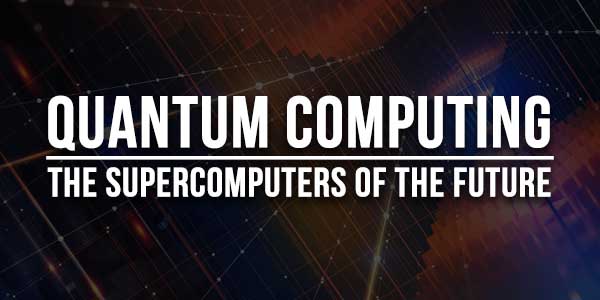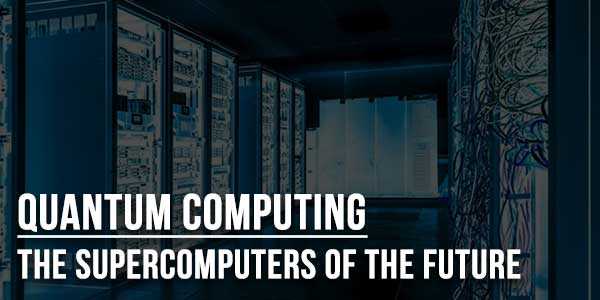
Quantum computing aims to revolutionize computing technologies with the help of quantum mechanics. In quantum computers, principles such as superposition or quantum entanglement will be used in the form of qubits and will create computers of virtually unlimited high performance. Whether quantum computers become a reality depends on technological obstacles such as interconnecting qubits and modern cooling systems.
Table of Contents
What Is Quantum Computing?
A ghost haunts the world of computing: quantum computing. If all the predictions are correct and quantum computers one day become marketable, they are supposed to trigger nothing less than a technological revolution. But how will this work? Through the laws of quantum mechanics. Among them are three principles in particular, which can be described as the pillars of quantum computing:
- Superposition: refers to the ability of a quantum system to assume several states simultaneously: 1 and 0 instead of 1 or 0.
- Quantum Entanglement: describes a quantum mechanical phenomenon in which two or more particles are entangled with each other and form an overall connected system; Changes made to one particle of the entangled quantum system automatically affect all connected particles.
- Quantum Collapse: describes the moment when systems are measured in superposition and therefore go to a defined state: from 1 and 0 to 1 or 0.
Classical computers are based on the binary electrical principle of “on/off” or “1/0”. Quantum computers, on the other hand, use non-binary, multidimensional, quantum mechanical states. Unlike classical computers, they do not solve problems one after another, but in parallel and simultaneously, even with complex inputs. In this way, they should allow a million times greater computing power and a significant reduction in calculation times.
If everything goes as planned, quantum computers will represent a technological evolutionary leap that will be felt in all areas related to the processing of complex data. These include e-commerce, cryptography, medicine, financial transactions, as well as big data, artificial intelligence (AI) and machine learning.
How Does Quantum Computing Work?
Quantum computing is not easy to understand. Instead of binary bits, quantum computers use qubits (quantum bits) to solve mathematical problems and process data sets. The classic bit is based on binary code.
A bit can only assume one of two states: 1 or 0. Qubits, on the other hand, work in a non-binary way and assume both states simultaneously: 1 and 0. Compared to binary system computers, the quantum mechanical approach multiplies by a million the performance potential of quantum computers. Qubits can not only assume states 1 and 0 simultaneously, but also an infinite number of intermediate states. Because quantum computers process information simultaneously, they are capable of solving complex tasks that are unsolvable for classical computers.
Superposition And Quantum Entanglement:
A simple image to illustrate it: imagine how classical computers and quantum computers work like the toss of a coin. Classical computers depend on how the coin falls. So they can only understand the state heads (representing 0) or tails (representing 1). Quantum computers, on the other hand, use a coin that never falls, but constantly spins in the air and always comes up heads and tails at the same time. That is, it is in a state of superposition.
Only after a measurement is made do qubits assume a binary state. Imagine the floating currency again. As long as no one is watching the coin, it spins in the air and shows heads and tails at the same time. If observation or state measurement is made, the coin falls to the ground and shows heads or tails. Furthermore, the qubits in quantum computers are entangled with each other. That is, if one qubit changes, the connected qubits also change due to quantum entanglement. This increases the calculation speed of quantum computers. Multiple qubits are then combined into binary-bit quantum registers to perform computing operations.
How Much More Power Do Quantum Computers Offer?
Science and industry have high hopes for the performance of quantum computers. Some scientists even hope that they can be used to simulate the Big Bang and demonstrate the existence of parallel universes. One thing is certain: despite the technical challenges, quantum computers offer unlimited potential. A qubit, for example, has more than twice the computing capacity of a bit, since it can simultaneously assume states 1 and 0 and numerous intermediate states. With each additional qubit, the computing power multiplies. Three qubits can assume eight states in parallel, 300 qubits are already two to the power of 300 states.
What Are The Advantages And Disadvantages Of Quantum Computing?
Advantages:
- Multiply computing power and calculation time even with large and complex data sets
- Process large amounts of input values simultaneously and not one after another
- Promote the development of artificial intelligence and machine learning
- Facilitate medical research, as quantum computers accurately simulate molecules and genes and process big data
- Offer unimagined potential for high-security encryption methods through prime number factorization
Disadvantages:
- High technical requirements regarding cooling and qubit entanglement
- They require a rethink and new digital infrastructures since quantum computers are based on different principles than classical computers
- Advancement poses a threat in the wrong hands
- Calculation results cover a range of results and may be more imprecise than binary computers

Possible Areas Of Application Of Quantum Computers:
It will be several years before quantum computers are used in practice. However, due to its advantages for complex data systems and data processing, the following application areas can be envisioned:
- Quantum simulations for natural sciences and medicine
- Quantum chemistry and quantum biology
- Creation of complex financial models
- Optimization of artificial intelligence and self-learning systems
- Optimization of encryption techniques in cryptography
- Smart technologies, such as smart networks, cities, and homes
- autonomous driving
- Data mining
- Aerospace
Technical Obstacles For Quantum Computers:
The main reason why quantum computers are still in the development phase is technical requirements. For example, qubits are very sensitive and volatile quantum systems. To obtain the most accurate results possible, quantum computers must be able to reliably entangle millions of qubits with each other. Another obstacle: Quantum computers can only operate near absolute zero temperature (-273.15 degrees Celsius). Just cooling today’s quantum chips takes days and state-of-the-art cooling systems.
Compared to known algorithms, quantum algorithms for solving complex problems and for data processing are based on completely new foundations. Among them, the formation of multidimensional calculation and storage units and simulation spaces, of which current computers are not capable. For this reason, new hardware and software will be needed for quantum computers to translate and process data sets into qubit-friendly forms. The way of programming, as well as programming languages, will also take new paths to comply with the principles of quantum mechanics.
Where Is Quantum Computing Today?
The concept of quantum computing first appeared in 1980, when physicist Paul Benioff described a quantum mechanical variant of the Turing machine. Theoretical physicist Richard Feynman and mathematician Yuri Manin finally formulated the performance potential of quantum computers compared to classical computers in the late 1980s. Since then, interest in quantum computers has continued to grow. Proof of this is that both governments and companies, for example, IBM, Google, and Microsoft, are working intensively on the realization of quantum computing and investing millions.
IBM launched a 20-qubit quantum computer in 2019. Google, for its part, proclaimed the achievement of “ Quantum Supremacy ” with the Sycamore chip on October 23, 2019, in a collaboration between Google AI and NASA. For the first time, Sycamore is said to have solved tasks that even the best classical supercomputers cannot solve. In 2020, IBM finally announced that it had developed one of the largest quantum computers called “Hummingbird” with 65 qubits. In 2021, IBM’s “Eagle” model with 127 qubits followed.
In early 2023, another big problem in quantum computing could be solved: transferring quantum computer data efficiently and coherently between chips used to be a difficult task, but that has changed. Now, after the progress is achieved, a success rate of up to 99.999993% can be achieved when transferring data between two chips.
Despite the constant development of supercomputers, they cannot yet be expected to completely replace classical computers. Much more likely is a hybrid approach with a combination of classical computers and quantum computers. This offers the advantage that quantum computers provide initial results from enormous amounts of data, which previously the more precise classical supercomputers processed according to the binary principle.

 About the Author:
About the Author:











Interesting overview of quantum computing and its potential. The explanation of how qubits work was clear. Technical obstacles like cooling and qubit connections remain. And limitations of imprecise results were noted. But the ability to process exponential data could enable breakthroughs.
Welcome here and thanks for reading our article and sharing your view. This will be very helpful to us to let us motivate to provide you with more awesome and valuable content from a different mind. Thanks again.